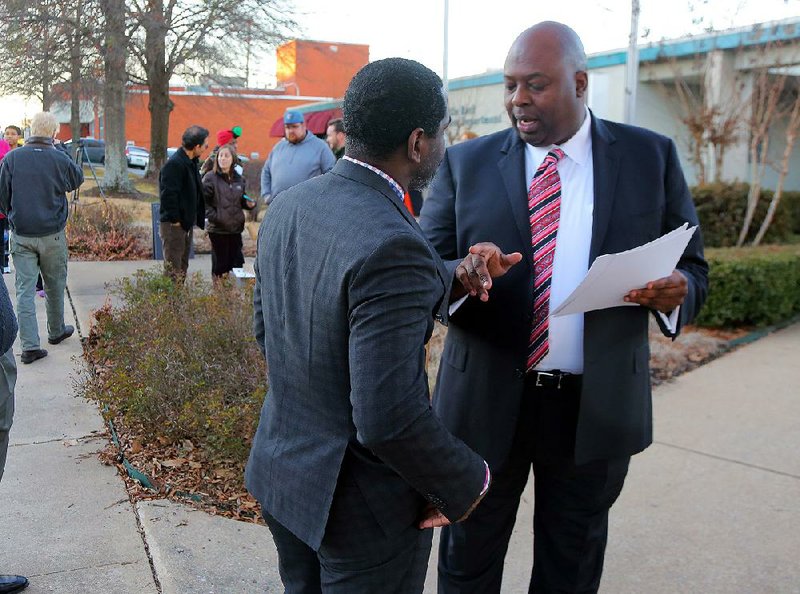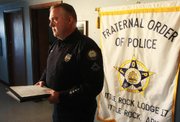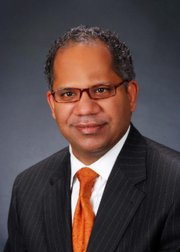The Little Rock Fraternal Order of Police said it will begin negotiations with the city next month to determine if passing a fitness test will be a condition of employment for Little Rock police.
The negotiations come after union leaders asked the city to halt the enforcement of a directive sent out by Little Rock Police Chief Kenton Buckner in May that would've required all sworn officers to pass a fitness test.
All sworn officers of the department already take the Annual Minimum Skills Assessment test each year during the annual in-service training, said John Gilchrist, vice president of the police union and an officer in the Police Department's training division. If an officer does not pass the test, he cannot work off-duty or ask for a transfer to another assignment, Gilchrist said.
The directive, sent out by Buckner on May 19, said that in 2014, 22 sworn members of the department failed the annual test. In response, the memo said, "all sworn members of the department are required to successfully complete the assessment."
The memo said anyone who failed the test "shall be relieved of duty by the Training Division Commander or his designee." The directive detailed a plan for anyone who fails the test that includes two chances to retake the test before "possibly employment separation proceedings will be commenced.
Buckner said Thursday that the directive was an issue between the city and the police union, and he said he would not comment on it.
In response to the memo, Fraternal Order of Police President Jarred McCauley filed a grievance with the city on May 28 saying the Little Rock Police Department had violated the statement of agreement between the city and the police union, which says the union can "establish wages, benefits, grievance procedures and other conditions of employment."
Bruce Moore, Little Rock city manager, responded to the grievance on June 3 in a letter to McCauley saying the city did not agree or disagree but that "we believe it would be beneficial to both parties and our working relationship to grant your remedy in the grievance."
Gilchrist said negotiations are currently in the beginning stages and he expects formal negotiations to start in October. The union had filed a lawsuit against the city asking a judge to compel the city to respond to an Arkansas Freedom of Information Act request. The union was seeking emails and other written documents about liability for the city not having a fitness test for police officers.
That lawsuit is still ongoing but negotiations will still start, said McCauley.
Gilchrist said most of the complaints from the members of the Police Department were not about being required to pass the fitness test but about the rules being changed, especially for people who have been on the job for decades.
McCauley said the group is just trying to stand up for the contract the city negotiated with police.
"Why do they give us a contract if they don't want to follow it?" he asked.
In recent years, the department switched from a test based on standards from the Cooper Institute in Dallas, which used timed 1.5-mile runs, push-ups and other exercises to test levels of fitness, to a test that requires officers to jump over fences and drag a 150-pound dummy.
"What happened was over the years people started to question the validity of how that [the Cooper test] actually applied to the work," Gilchrist said, adding that push-ups are never required when an officer is chasing a suspect.
The current test used by the department asks officers to do things more applicable to job performance while wearing a 10-pound vest to simulate the weight of gear. Then they have to complete the following tasks in two minutes and three seconds:
The officer is sitting in a patrol car with the seat belt fastened and the door closed. The instructor yells "go" and the officer unbuckles the seat belt and opens the door. Time starts when the door opens.
The officer runs to a 4-foot chain-link fence and climbs over it. Then the officer climbs over a 5-foot wooden fence. Next the officer jumps over a 3-foot ditch. Then the officer must duck under obstacles placed at 4 and 5 feet high. That's followed by zig-zagging through traffic cones on the ground. The officer then must jump up onto a 2.5-foot high platform and jump down from it.
Finally the officer runs to a dummy weighing about 150 pounds and drags it two directions for 20 feet. The time ends when the entire dummy passes over the finish line. The course is approximately 200 yards in length and the officer must run to each obstacle.
"On average most people pass this test," Gilchrist said. "Out of all police officers there was maybe a dozen people that failed the test. And most didn't fail it. They didn't make it in two minutes and three seconds."
Few people quit because they couldn't do it, Gilchrist said.
Gilchrist said a lot of officers belong to gyms and that exercise equipment is provided at each patrol division, training division and the FOP has its own gym as well.
"You have to take the initiative and be dedicated enough to know you're in a job that requires a certain level of physical fitness," Gilchrist said.
Metro on 09/14/2015
Reader poll
Should passing an annual fitness test be be a condition of employment for Little Rock police?
- No
- Yes
71 total votes.


